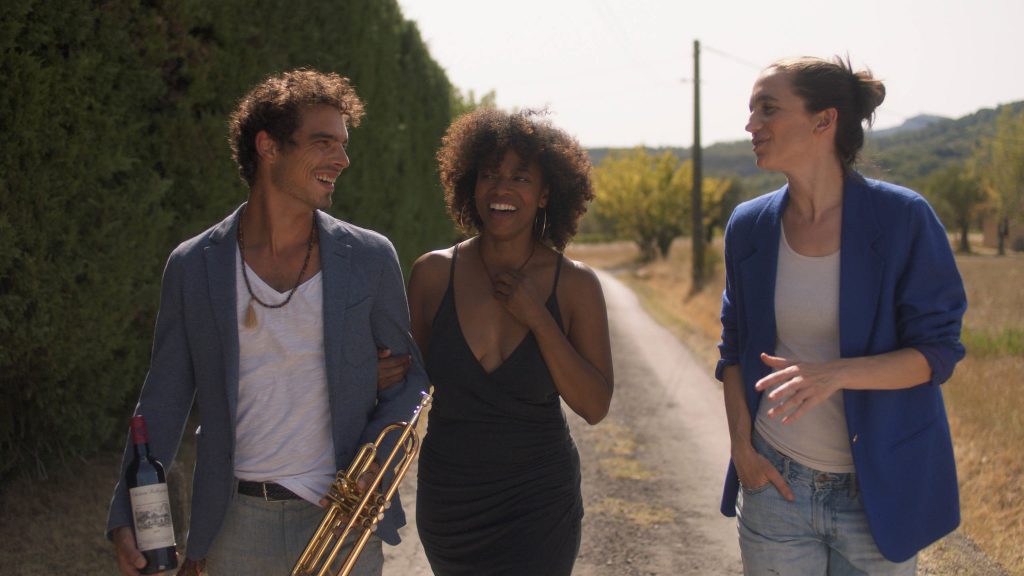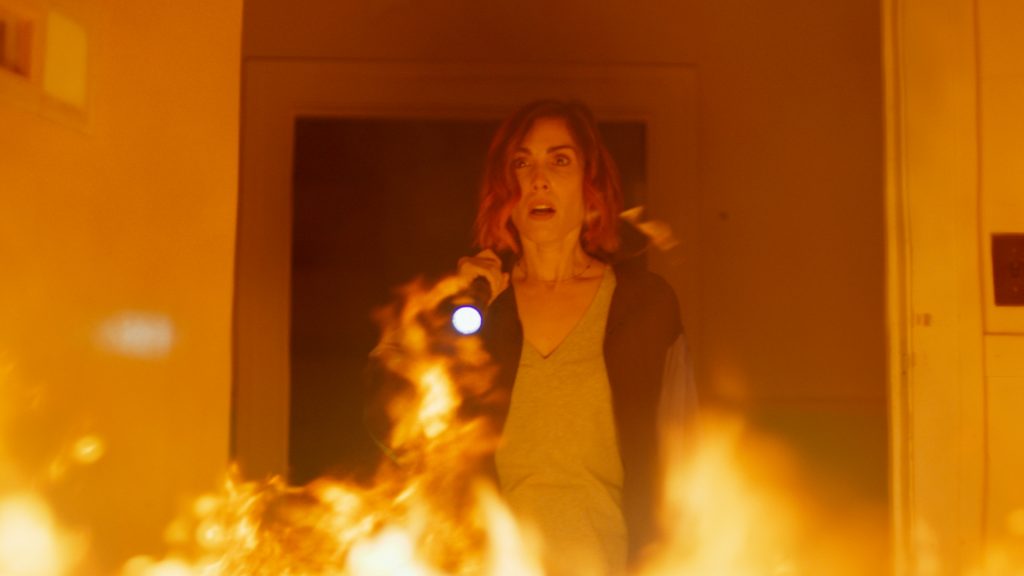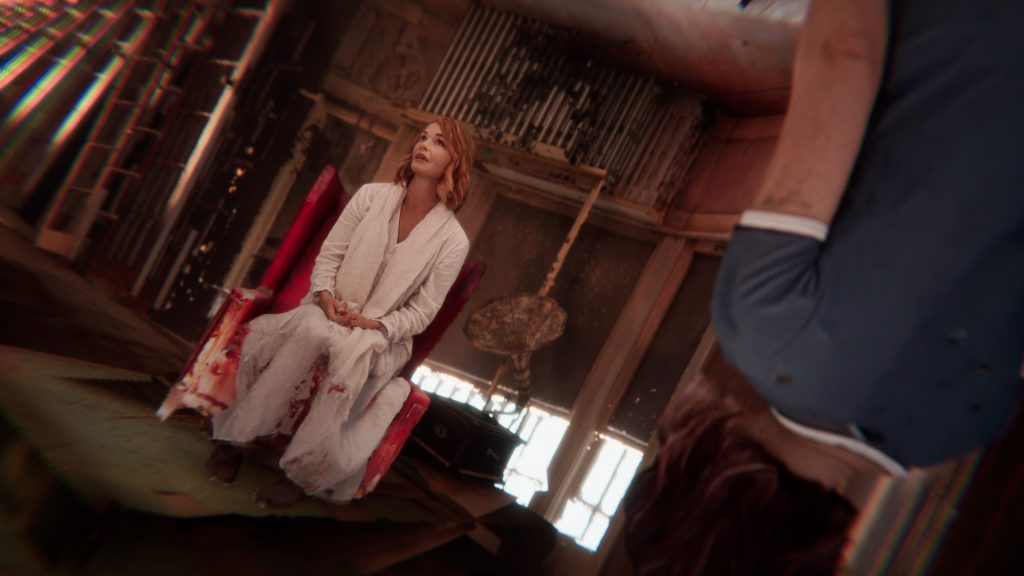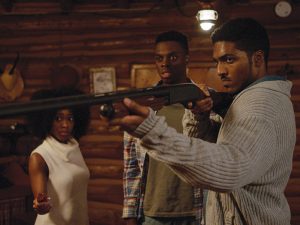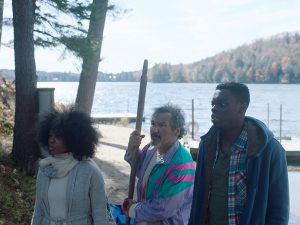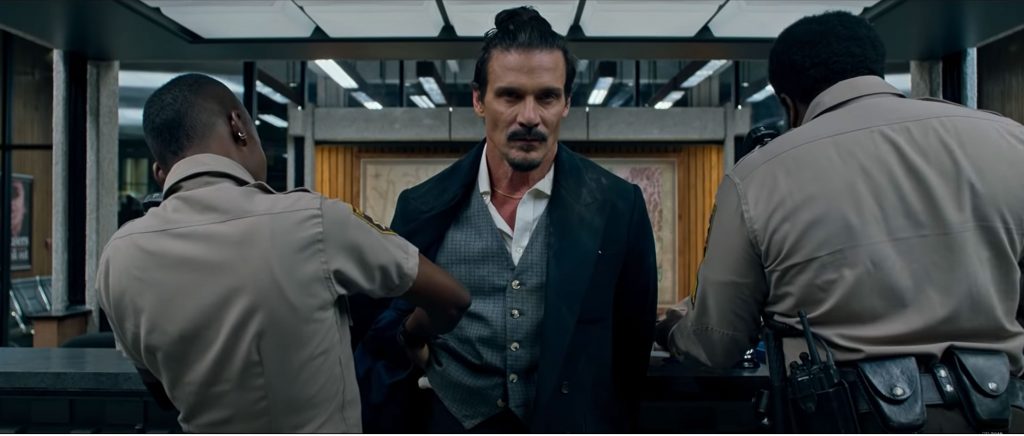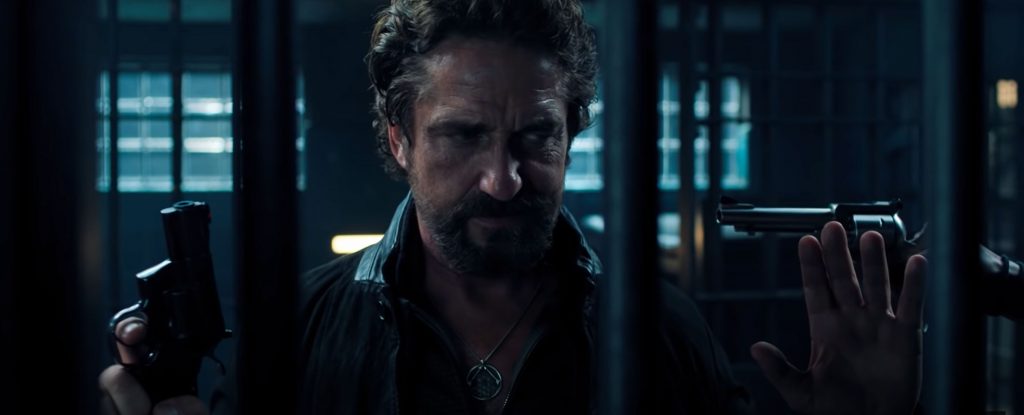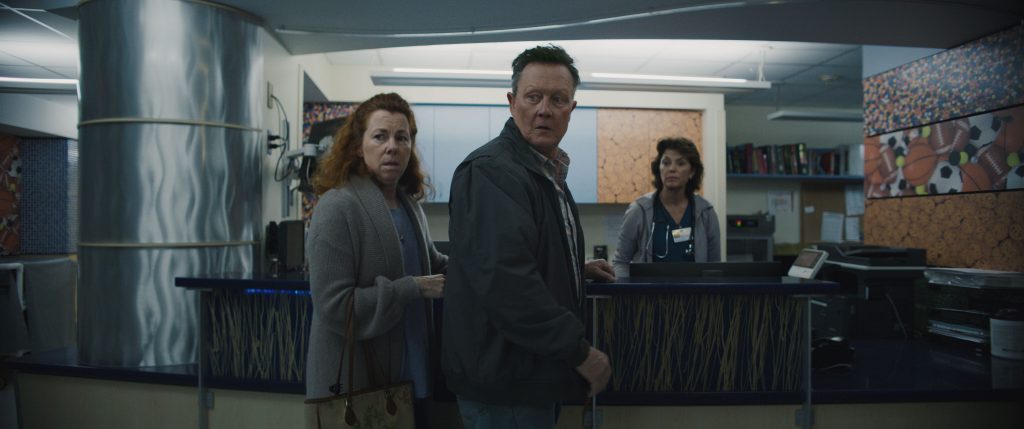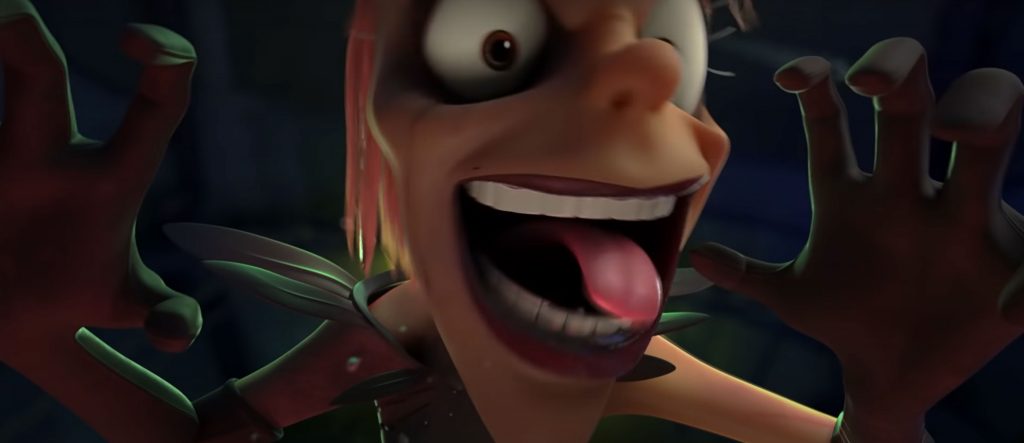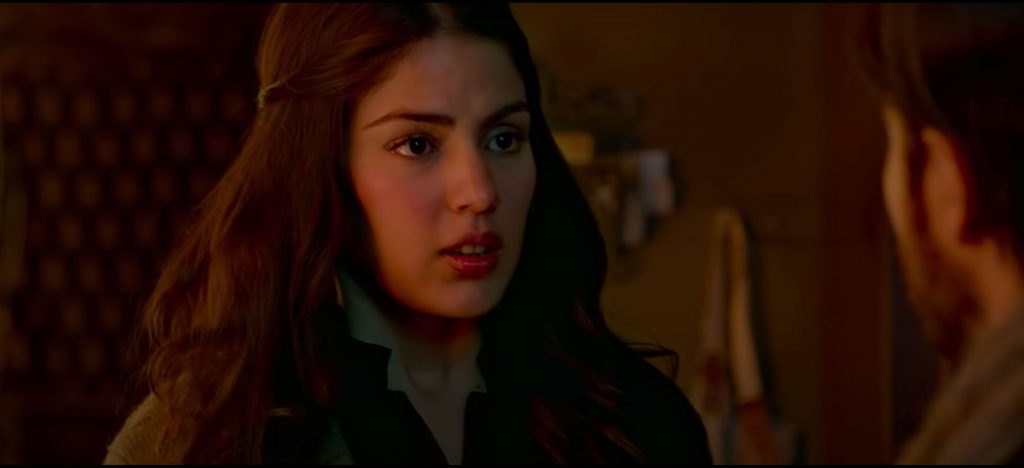September 11, 2021
by Carla Hay
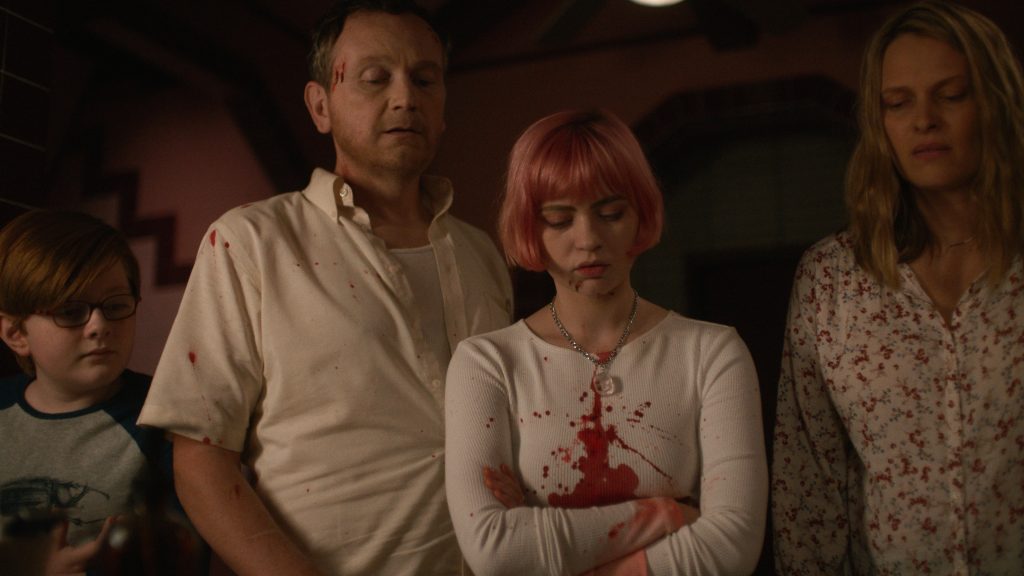
Directed by Sean King O’Grady
Culture Representation: Taking place in an unnamed U.S. city, the horror film “We Need to Do Something” features an all-white cast representing the middle-class.
Culture Clash: A family of four people are trapped inside their bathroom during a storm and find out that they could be the victims of something sinister and supernatural.
Culture Audience: “We Need to Do Something” will appeal primarily to people who like watching any nonsensical, atrociously made horror flick, no matter how bad it is.
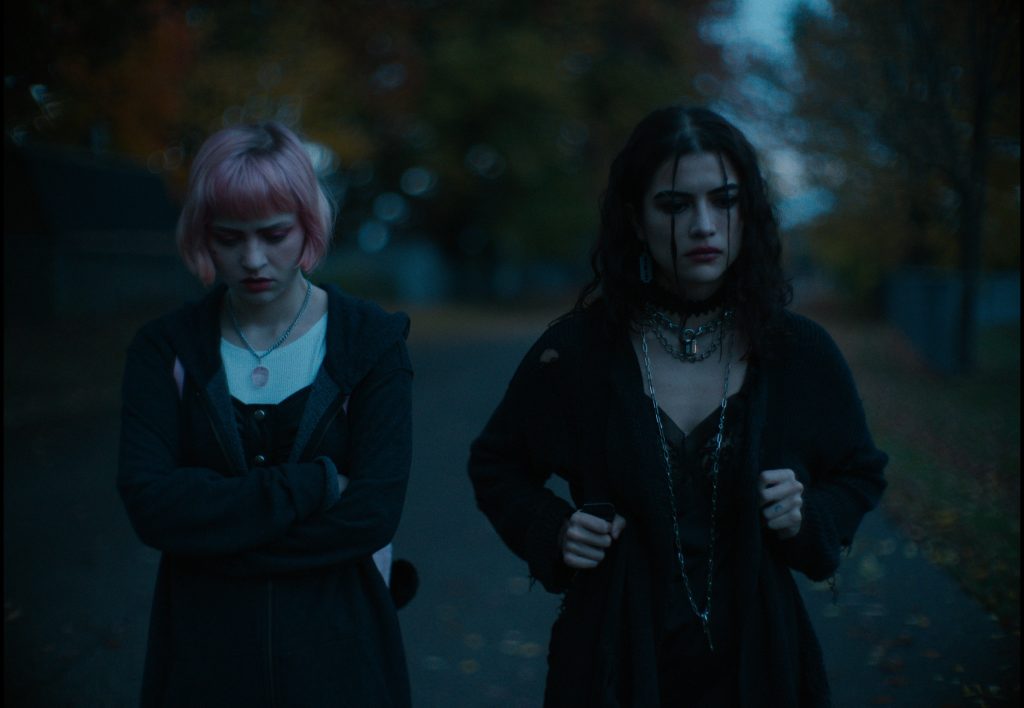
There are untold numbers of talented aspiring filmmakers who have great screenplays and need a big break to get their first feature film made. And that’s why it’s almost offensive that garbage like “We Need to Do Something” gets spewed into the world. The title of this movie should be “We Need to Do Something About Warning People to Avoid This Toxic Trash Posing as a Horror Film.”
There are numerous horrifically bad horror movies that get made in any given year, usually by the same type of no-talent filmmakers who like to copy each other and try to outdo each other with disgusting or misogynistic content. “We Need to Do Something” can be considered among the worst of the worst because it’s truly time-wasting garbage with an almost non-existent plot, idiotic dialogue, horrendous acting, and worst of all for a horror movie: It’s not even scary.
Directed by Sean King O’Grady, “We Need to Do Something” is based on Max Booth III’s novella of the same title. Booth also wrote the “We Need to Do Something” screenplay. You can tell this was based on a short story because 90% of this movie is badly conceived filler that goes nowhere but is instead stretched out into a feature-length run time. However, the filmmakers did such a terrible job with this story, it’s doubtful that it would’ve been better as a short film.
The entire plot of “We Need to Do Something” is about a family of four trapped in their house’s bathroom during and after a storm. Something large and heavy is blocking the door, which leads to the front yard, so that the door can barely open. There’s a window in this bathroom, which these morons don’t try to break to escape when the storm ends.
Bizarre things start to happen. And then, the family’s teenage daughter, who has been dabbling in witchcraft in a same-sex romance with a classmate, becomes convinced that these spell experimentations have something do with the family being trapped. The father gets increasingly drunk until he becomes more dangerous than whatever is trapping the family in the bathroom. And there’s a rattlesnake that shows up twice.
The first thing that viewers might notice is how weird it is that a house is designed to have a bathroom open into the front yard, when most houses’ bathrooms are located further inside a house. But the terrible production design ideas are the least of this crappy movie’s problems. This entire cesspool of filmmaking is an absolutely dull chore to watch.
If you want to torture yourself and watch until the end, you’ll see repetition of these scenarios to irritating levels: There’s no food in the bathroom, but somehow patriarch Robert (played by Pat Healy) has enough liquor and other alcohol to guzzle so that he gets drunk and yells abusively at other members of his family. Robert’s wife Diane (played by Vinessa Shaw) does her best to try to calm everyone down, and she tries to stop Robert from doing some heinous things as he becomes increasingly unhinged,
Robert and Diane’s daughter Melissa (played by Sierra McCormick), who’s about 16 or 17 years old, spends most of the movie sulking, getting angry at her parents, and thinking about her girlfriend Amy (played by Lisette Alexis), who is only seen in flashbacks. Robert and Diane’s son Bobby (played by John James Cronin), who’s about 11 or 12 years old, spends most of the movie being terrified, which is only exacerbated when his abusive father unleashes a lot of rage on Bobby.
In the beginning of the movie, Diane is telling everyone that the gusty winds heard outside are just a regular thunderstorm. She insists it’s not a tornado. It’s not fully explained why they’re all huddled in the bathroom, but it’s mentioned at some point that the house’s roof has come off, so they’re afraid to go in the rest of the house. In other words, it’s not a regular thunderstorm, so how dumb does that make Diane? The foolishness continues.
Meanwhile, if you and your family are experiencing an emergency, such as your house’s roof coming off in a storm, the first thing that you would probably do is get help to rescue you and your family. But no, that’s not what happens in “We Need to Do Something.” Melissa is using her phone to text messages to an unidentified person (probably Amy) who’s not answering her messages. One of Melissa’s messages says: “Please talk to me. I’m scared.”
These idiots are not thinking about calling anyone for help. In fact, Diane asks in the middle of this crisis if they want to play a board game called Goths and Vandals. Who thinks like this when they’re stuck in a bathroom with their house roof blown off? Only moronic people in a horrendously bad horror movie.
The phone that’s working perfectly somehow ends up in Robert’s hands. When he tries to open the door to the front yard, he accidentally drops the phone outside. There goes their only method of communication to the outside world. The phone could possibly get blown away by the heavy gusts of wind outside.
Melissa is enraged that her phone is now lost. She tries to poke her hand out the door to find it, but it’s of no use. Her parents also tell her to shut the door since the wind gusts are too strong. Melissa sulks some more because her phone is lost, and now they have no way to call for help. You should’ve thought of that while you were texting a friend who wasn’t answering your messages.
“We Need to Do Something” has several flashbacks to Melissa’s relationship with Amy. Both teenagers dress like they’ve spent too much time at Hot Topic, because they wear clothes and makeup that look like shopping mall versions of being a Goth or steampunk. Melissa has pink hair and pink makeup spread around her eyes like a raccoon. Amy sticks to basic black.
These flashback scenes in the movie just seem like an excuse for the filmmakers to show teenage girls making out with each other, sometimes with blood on their faces after they’ve done a witch ritual. Amy and Melissa have told each other “I love you,” just so people watching the movie know that wannabe teenage witches need love too. Melissa and Amy are apparently secretive about their romance and will go to extreme lengths to not let other people at their school find out.
And so what do they do? They start kissing each other on some bleachers at school when they think no one else is around. Because apparently, they think the best way to keep their romance a secret at school is to make out with each other in a public place at school. Of course, someone does see Melissa and Amy kissing at school. It’s a fellow schoolmate named Joe (played by Logan Kearney), whom Amy describes as a creep who’s been stalking her.
But this is the problem for Melissa and Amy: Joe had his phone out and filmed the two girls kissing each other. Melissa and Amy are paranoid that Joe will do something with that video footage that will ‘”out” them, ruin their reputations, and make them outcasts. And so, Melissa and Amy decide to cast a spell on Joe to get revenge on him.
While this family of four is trapped, they hear voices of people or creatures outside but the door can’t open wide enough to see who or what is making these sounds. At one point, it sounds like a dog is outside the door. When Melissa tries to pet it and says, “Good boy,” whatever is outside suddenly has a sinister-sounding human voice that responds, “I’m a good boy.”
Believe it or not, rock star Ozzy Osbourne is that voice, according the film credits. Someone must’ve called in a big favor. Osbourne, who famously bit off the head of a real bat during a 1982 concert, is namechecked in this movie when the snake appears. Robert is able to push the snake out the door, but he wonders out loud if they should’ve killed the snake for food.
Robert thinks that the way he could’ve handled the snake would be to “bite the head off, like Ozzy.” Diane replies, “Wasn’t that a bat?” Robert says, “Snakes are just bats that can’t fly!” Apparently, Robert wasn’t paying attention in school when they taught the difference between reptiles and mammals.
The atrociousness of this story devolves into scenes involving tongues getting ripped out of mouths, as well as talk of cannibalism when the trapped people haven’t been able to eat anything for days. It all leads to a vile ending that serves no purpose except to show that the filmmakers of “We Need to Do Something” will sink to the lowest depths of stupidity to make a horror movie.
IFC Films/IFC Midnight released “We Need to Do Something” in select U.S. cinemas, on digital and VOD on September 3, 2021. UPDATE: The movie is set for release on Blu-ray and DVD on June 16, 2022.



